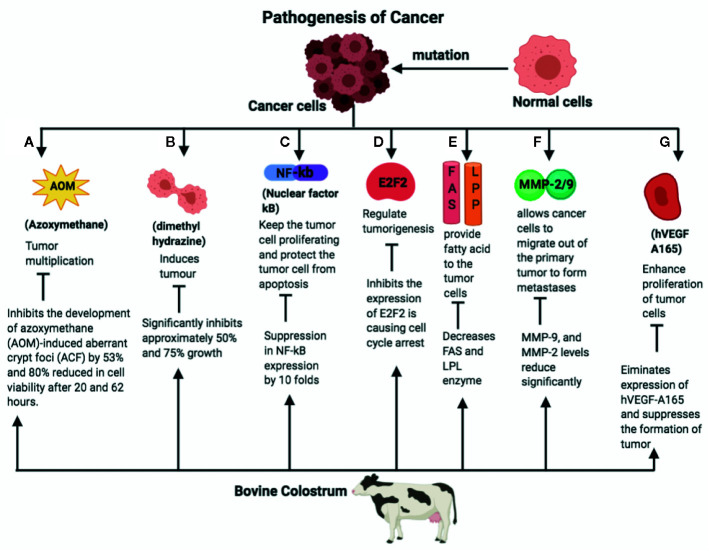Figure 1.
A normal cell mutates into the cancer cell, which divides enormously and spreads across the surrounding tissues. The pathways responsible for initiation and metastasis of cancer and the role of bovine colostrum (BC) on the amelioration of the same is given as follows. (A) Azoxymethane is responsible for tumor multiplication and cancer cell development. BC inhibits the development if azoxymethane (AOM)-induced aberrant crypt foci (ACF), therefore reducing the cell viability. (B) BC inhibits the proliferation of tumor angiogenesis by dimethylhydrazine. (C) Nuclear factor-κB (NF-κB) is the transcription factor that is responsible for cancer cell growth, tumor formation, and tumor cell proliferation, and prevents tumor cells from apoptosis. BC suppresses NF-κB expression approximately by 10-fold. (D) E2F2 factor plays an important role in the tumorigenesis of the cancerous cells. BC inhibits expression of E2F2 factor and initiates cell cycle arrest. (E) BC inhibits the enzymes fatty acid synthetase (FAS) and lipoprotein lipase (LPL), which in turn inhibit neoplastic lipogenesis. (F) Matrix metalloproteinaise 2/9 (MMP-2/9) allows cancer cells to migrate out of the primary tumor to form metastases. BC supresses the levels of the MMP- 2/9. (G) BC inhibits the expression of Human Vascular Endothelial Growth Factor (hVEGF), which is responsible for proliferation of the cancer cells. AOM, Azoxymethane; ACF, Azoxymethane induced aberrant crypt foci; NF-κB, Nuclear factor Kappa B; E2Fi, E2F Transcription Factor 1; FAS, Fatty acid synthetase; LPL, Lipoprotein lipase; MMP, Matrix metalloproteinase; hVEGF, Human Vascular Endothelial Growth Factor.

